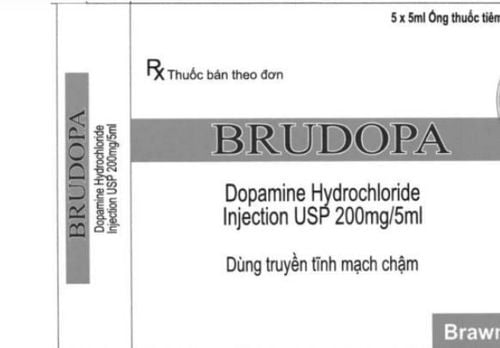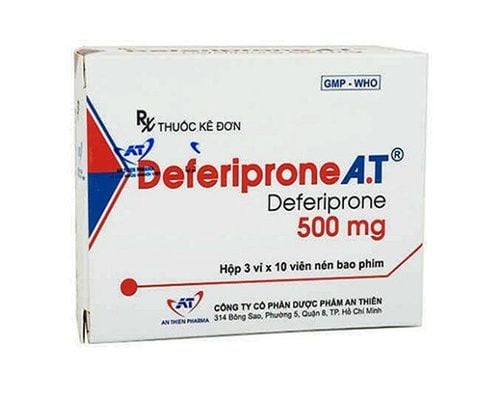This is an automatically translated article.
Derikad is an antibiotic commonly used in the treatment of acute iron poisoning or chronic iron overload. The correct use of the drug will help to quickly relieve the symptoms of iron poisoning such as vomiting, severe abdominal pain, heart palpitations or convulsions,...
1. What is Derikad?
Derikad medicine contains the active ingredient Deferoxamine Mesylate 500 mg.
Deferoxamine Mesylate has the ability to chelate free iron in the blood or in cells to form FO complexes and mobilize and chelate aluminum to form AIO complexes. These complexes are all capable of being completely excreted in the urine, helping to enhance the excretion of iron and aluminum in urine and faeces to minimize pathological iron and aluminum stagnation in the organs. Deferoxamine active ingredients are slowly absorbed from the gastrointestinal tract, absolute bioavailability is less than 2% when administered orally, so they are often used by intramuscular injection or slow subcutaneous infusion.
2. Indications and contraindications
2.1. Indications Derikad is indicated for use in the following cases:
Patients with acute iron poisoning, the serum iron concentration is over 450 - 500 micrograms/decilit or when typical signs appear. of clinical iron toxicity. Patients with chronic iron overload secondary to frequent blood transfusions in the treatment of diseases such as thalassemia, congenital anemia and some other anemias. Support treatment of iron pigmentation. Treatment of aluminum accumulation in patients with renal failure (testing showed serum aluminum concentrations above 60 micrograms/litre). Patients with anuria, primary iron pigmentation. 2.2. Contraindications Derikad is contraindicated in people with hypersensitivity to any of its ingredients.
3. Dosage and usage
3.1. Dosage of Derikad drug is used with the reference dose as follows:
Acute iron poisoning: Adults take the initial dose of 1g, followed by 2 doses of 0.5g, 4 hours apart. Depending on the clinical response, the patient can use an additional dose of 0.5 g, every 4-12 hours, up to 6g/day or intravenously at a dose of 15 mg/kg/hour. Children use the drug intramuscularly at a dose of 50 mg/kg/time, every 6 hours and up to 6g/day; while 15 mg/kg/hour intravenously, up to 6g/day. Chronic iron overload: Adults use Derikad 0.5-1g/day intramuscularly or 1-2g/day subcutaneously by a monitored infusion device. Children use intravenous drug at a dose of 15 mg/kg/hour, up to 12 hours/day or by subcutaneous infusion of 20-50 mg/kg body weight/day using a monitored infusion device. Patients with thalassemia anemia: In case of need for blood transfusion, give slow intravenous infusion of 2 g deferoxamine for 1 unit of blood (be careful not to exceed 15 mg/kg/hour) and not in the same intravenous line as with thalassemia. blood transfusion. Bone disease: Use Derikad at a dose of 20-40mg/kg for each hemodialysis session, the number of times to use the drug depends on the clinical condition of the patient. Patients with renal impairment: In case of clearance less than 10 ml/min, reduce the dose by 50%. 3.2. How to take Derikad medicine is used by intramuscular injection or intravenous infusion. In case the patient is not in shock, the drug should be given by intramuscular injection. In subjects with cardiovascular collapse or shock, slow intravenous injection is recommended. In addition, if treating acute iron poisoning should not be administered subcutaneously.
The way to prepare the reference injection solution is as follows:
Intravenous solution: Use Derikad drug dissolved with distilled water for injection to make a solution containing 250 mg/ml. When mixing, care must be taken that the drug must be completely dissolved before smoking. Next, you continue to mix the drug solution into isotonic saline, or 5% glucose or Ringer lactate solution to create a solution with a concentration of 10 mg/ml (maximum 25 mg/ml). The injection is then administered at a rate not exceeding 15 mg/kg/hour. Solution for intramuscular and subcutaneous injection: Use Derikad drug dissolved in distilled water to get a solution of 250 mg/ml. Note that the drug must be completely dissolved before taking it into the syringe to avoid affecting its effectiveness.
4. Side effects
The use of Derikad can cause some of the following side effects:
Common side effects: Pain, swelling, erythema, itching, rash, which may be accompanied by fever, chills and fatigue. Rare side effects: Anaphylactic reactions with or without shock, angioedema, hypotension, dizziness, occurrence of seizures, increased neurosis in patients with aluminum encephalopathy. Some cases appear itching, rash, urticaria, increased transaminases, nausea, vomiting, abdominal pain, diarrhea, visual effects, tinnitus, hearing loss. Extremely rare side effects: Irreversible anemia, thrombocytopenia, peripheral sensory disturbances, paresthesias, decreased liver and kidney function, pulmonary infiltrates.
5. Drug interactions
Using Derikad with Vitamin C can cause heart disorders. Concomitant administration of Derikad with proclorperazine may cause loss of consciousness. The drug should not be mixed with other solvents than directed, which will affect the quality of the drug. To avoid possible drug interactions, patients need to inform their doctor about the drugs and supplements they are currently using before taking Derikad.
6. Be careful when using Derikad
Rapid intravenous administration of Derikad may cause skin flushing, urticaria, hypotension and shock in some cases. Therefore, patients should use drugs for intramuscular or intravenous infusion, slow subcutaneous injection. Cataracts can occur in people treated with Derikad for a long time. Therefore, patients should periodically have their eyes checked every 3 months during long-term treatment with the drug, especially when taking high doses above 50 mg/kg/day. Caution should be exercised when using Derikad for pregnant and lactating women. Because Derikad does not affect the nervous system, patients can completely take the drug while driving. Above is some information about Derikad drug that readers can refer to. The use of the drug needs to be done by a medical professional, so the patient needs to see a doctor to be prescribed the appropriate prescription to bring the best treatment effect.
Please dial HOTLINE for more information or register for an appointment HERE. Download MyVinmec app to make appointments faster and to manage your bookings easily.













